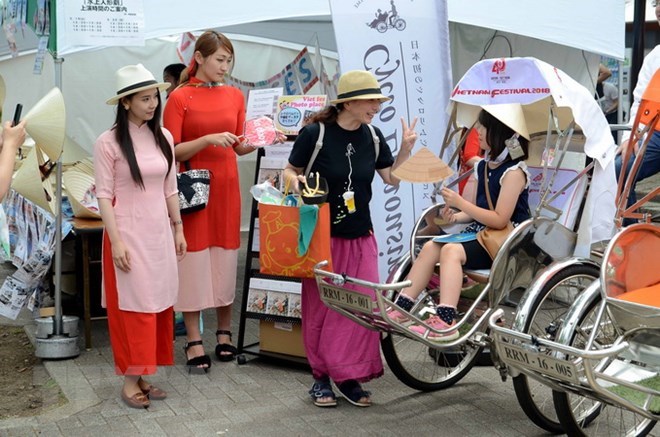
The Vietnam Festival 2018 kicked off at Yoyogi park in the Japanese capital of Tokyo on May 19 on the occasion of the 128th birth anniversary of late President Ho Chi Minh.

Visitors pose with
Vietnam's three-wheel cyclos
(Source: VNA)
Speaking at the opening
ceremony, Vietnamese Ambassador to Japan Nguyen Quoc Cuong said that the event
is part of important activities to take place in
Japan in 2018 in celebration of the
45th anniversary of bilateral diplomatic ties.
Besides
Tokyo, the Vietnam Festival will be
organised in other localities across
Japan,
including
Fukuoka, Aichi,
Osaka, Kanagawa, and Saitama, within this
year, Cuong added.
Former Japanese Prime Minister Yasuo Fukuda expressed his delight at the
development of the two countries’ relations, while hoping that the friendship
will be strengthened to meet aspirations.
Deputy head of the Japan-Vietnam Friendship Association Motoyoshi Ryoikichi
told the Vietnam News Agency that the bilateral ties are in a flourishing
period.
There are around 240,000 Vietnamese people living in
Japan, a tenfold increase compared
with the figure five years ago.
The
Vietnam festival was
first held in
Japan in
September 2008, becoming the biggest-ever festival of
Vietnam held in
the country, attracting 150,000 visitors in just three days.
Since then, the festival has been organised annually and become the largest
cultural exchange event between the two countries.
This year’s event has 120 pavilions, including 60 cuisine ones, and 50 others
introducing the image of Vietnamese land and people and Vietnamese goods, along
with art performances.
The two-day festival is expected to attract over 150,000 visitors.
Source: VNA
Phong Phu commune, Tan Lac district of Hoa Binh province, is widely regarded as the cultural heartland of the Muong ethnic group. Among its many traditional communities, Luy Ai hamlet (formerly Ai hamlet) stands out as a rare location where the customs and way of life of the Muong Bi people remain largely intact.
The Truong Kha temple festival, a distinctive cultural event held every three years in Vu Ban township, Lac Son district, returned recently with vibrant rituals and folk traditions of the Muong people. Located next to the Buoi River in the Muong Trao fields, the Truong Kha Temple is dedicated to the three Kun Dol deities, revered for teaching farming techniques, irrigation, weaving, and protecting the harvest.
The demand for spaces serving community activities of residents in various areas across Hoa Binh city has been satisfied as local cultural houses now feature modern, spacious facilities thanks to the effective implementation of Resolution No. 49/NQ-HDND issued on December 28, 2021 by the city People's Council, which approved the plan for reorganising, converting, and allocating land for the construction, repair, and expansion of cultural houses in Hoa Binh’s villages and residential areas until 2025.
At the end of May, the Hoa Binh Provincial Ethnic Arts Troupe organized a series of performances for residents in Region 2 and Region 3 communes across the province. Bringing art to ethnic communities in remote, isolated, and especially disadvantaged areas has become a meaningful activity. These are not merely artistic performances but also journeys to disseminate cultural values, enrich spiritual life, and contribute to preserving the cultural identity of ethnic minorities.



